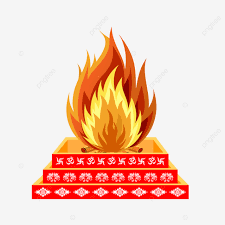
HOMAM
Homams, deeply rooted in ancient Vedic traditions of Hinduism, are intricate rituals centered around the sacred fire, Agni. These rituals are performed with meticulous adherence to prescribed procedures, involving specific chants (mantras), offerings (ahutis), and ceremonial gestures aimed at invoking divine energies and blessings. The significance of homams lies in their multifaceted spiritual, psychological, and social dimensions. Spiritually, homams are believed to cleanse the environment and purify the participants' minds and souls. The act of offering into the sacred fire is seen as a symbolic purification process, where impurities—both physical and metaphysical—are believed to be consumed by Agni, transforming them into positive energy and vibrations. Psychologically, participating in a homam is considered a form of meditation and spiritual communion. The rhythmic chanting of Vedic mantras during the homam creates a harmonious atmosphere conducive to concentration and introspection. It is believed to quiet the mind, enhance focus, and cultivate a deeper connection with the divine and cosmic energies invoked through the ritual. Socially, homams play a unifying role within the community. They are often performed on auspicious occasions such as weddings, housewarmings, and festivals, serving as a means to seek divine blessings for prosperity, health, and harmony in communal life. Homams also reinforce cultural identity and continuity, passing down ancient traditions and knowledge from one generation to the next. Each homam is unique, tailored to specific deities and purposes. For example, the Agni Homam venerates Agni as the primary deity, symbolizing fire's transformative power and its role in linking humans with the divine. Other homams may invoke different deities like Lakshmi for wealth, Saraswati for knowledge, or Shiva for spiritual growth, depending on the devotee's spiritual aspirations and needs. In essence, homams encapsulate the essence of Hindu spirituality—offering devotion, seeking divine grace, and fostering a deeper understanding of cosmic principles. They are a testament to the rich tapestry of rituals that continue to bind Hindu communities worldwide, embodying profound spiritual meaning and cultural significance in their practice..